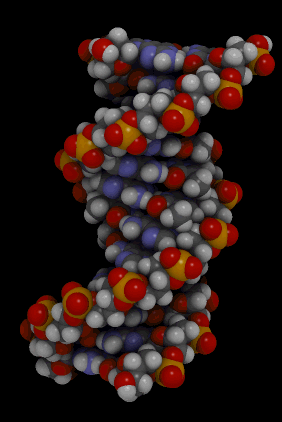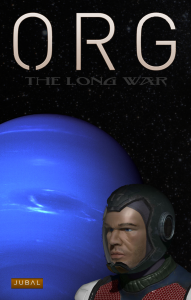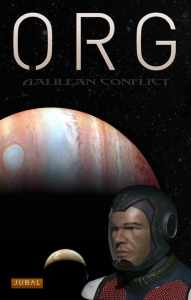 ++++ DATE 28.2.2464
++++ DATE 28.2.2464
++++ TIME 12:31 Solar Standard Time
++++ LOCATION Onboard the station The Ark, 3561 km matching velocity to Martian Trojan Asteroid 5261 Eureka
First, there was only a vague sensation of warmth.
It built slowly, a growing thing that his mind struggled to shape into a word. There. Warmth he thought. I am warm. More thoughts followed. Nausea. Vertigo. Oxygen. Oxygen. Oh god I need to breath…
He opened his eyes.
An older man, clean-shaven and ebony so dark he seemed almost to glow in the bright station light. Leaning over where he lay on his back gasping and choking was a blonde woman with a too-even complexion and a look of stock consideration in eyes that were similarly too clear, too unblinking.
“Mr. Rivera? Isaac Rivera?” the older man was asking him.
Isaac waved him off, still coughing as he pushed himself to a seating position. The blonde woman held a square bowl in front of him. He spit into it, coughed, spat some more. “Madre de Dios, how I fucking hate cryo,” he said hoarsely.
The older man relaxed almost imperceptibly. “Mr. Rivera, I am Station Administrator John Mokwena. Welcome to the Ark. We’re glad to have you here.”
“I’m not,” Isaac said. “But the money was too good to pass up, even with the glorious promise of months in cryo.”
John shook his head. “I apologize for the necessity, but for reasons of corporate security we needed to bring you here in a rather roundabout manner. The rest of us did as well.”
Isaac looked at the blonde woman. “She was never in cryo.”
“Well, no. Forgive me, I have been remiss in my courtesies. This is Erinna-CIT-59-M. Currently, at least.”
The blonde woman smiled. “How do you do, Mr. Rivera? This is not actually my specialty, but I am versed in cryogenic complications, not that any such are in evidence.”
Isaac accepted a cup of something hot that might have even been coffee from John with a nod of thanks. He looked quizzically at her. “CIT?”
Erinna nodded. “Yes. My sisters and I remain under contract, but have our provisional citizen classifications, legally recognized in both the Southern Bloc and on Mars. And the Hildas Triangle, of course.” She smiled, flashing dimples.
“That’s a hell of a chassis you have there. I almost thought you were human.”
“It is,” she agreed. “Carlisle Pharmaceuticals was most eager to obtain both our cooperation and our discretion, therefore we thought it a reasonable condition of our indentured service. Among other conditions, of course. It wouldn’t pass any kind of real biometric scan, but short of that it is usually sufficient to pass for fully human.”
Isaac grunted. “Well, I’m here. Shall we get started?”
John lifted an eyebrow. “You are quite certain you would not like to rest first? We have prepared quarters for you in A Ring.”
“I am quite certain I would not. I have been resting for far too long, and no offense to anyone here, but I’d like to finish what I came here to do and get the fuck back home.”
John nodded. “Very well, then. Once you are dressed join us outside, please.”
Ten minutes later Isaac felt human enough to face the world, or at least the world of this station. He stepped outside the small medical chamber to find John and Erinna discussing something to do with…yes, embryonic development. Or something like that.
Both looked up as they noticed his arrival. John held out his hand. “Come, let me show you the labs.” The three headed down the way the station administrator had indicated, an unremarkable corridor.
Isaac looked around. “Full gravity? I was expecting partial simulated.”
“Yes. Most of us onboard are from the Southern Bloc, or at least Earth. In addition, it was felt that the needs of the project would be best served by mimicking the expected developmental conditions dictated by human evolution.”
“This must have cost a pretty penny.”
John nodded. “The Arc consists of three habitat rings, two of which have been spun up to full simulated. A Ring is labs and domiciles. B Ring is the vats. C Ring hydroponics and storage, which is Europan standard. Each habitat ring is basically a refurbished super dreadnought habitat ring, though obviously with none of the weapons or other toys.”
“We can’t possibly be undefended here, though, I hope,” Isaac asked.
“The Arc maintains six full wings of combat drones and a reserve destroyer on picket.”
“Not a lot of privateers are going to brave that.”
“No,” John agreed. “The original plan had even more significant defenses, but it was felt deploying more would draw too much attention to what is, after all, supposed to merely be a pharmaceutical research station.” They turned into a large hall filled with more scientific equipment than Isaac had ever seen in one place in his life. John and Erinna headed directly for a small cluster of white-coated researchers beside a collection of holographic displays and a large vat.
Three women; two identical in appearance to Erinna, the third a short, thin woman with a pained expression on her face.
“Isaac, you have met their sister, but allow me to introduce you to our neurologist, Nossis-CIT-60-M, and sociologist Sappho-CIT-61-M.” John indicated the shorter woman. “And, of course, the lead researcher of the project, Dr. Khulud Amani al-Qahtani.”
Isaac looked up the name quickly with his implant. New Delhi Medical School. Worked for the Department of Corrections in Johannesburg for twelve years. Specialty personality wipes. Isaac held out his hand. “Dr. Al-Qahtani.”
Dr. Al-Qahtani took his hand, frowning. “I’m sorry, who are you?”
“Isaac Rivera is our new systems analyst from Chile. He is something of a prodigy himself. I told you about him,” John said gently.
“Yes, yes, of course. Well. Hopefully he can make himself useful.”
“How are you today?” John asked carefully.
Dr. Al-Qahtani waved off the question irritably. “Nothing’s changed since the last time you asked me that. I have to check up on the vats in B Ring now, though. I’ll be back later.” She glanced at Isaac. “Nice to meet you. The others will get you up to speed.” She turned and left the lab.
John nodded to Isaac. “I will leave you in their capable hands. They’re the real brains of the operation.”
The one he had introduced as Sappho flashed a smile. “Flatterer, John. Perhaps you will reconsider our offer?”
John glanced quickly at Isaac, coughing anxiously. “I will not. My husbands would kill me. I have some sense of self-preservation.”
“How tragic,” Sappho murmured. “Oh well. Perhaps someday.” After John had left the hall, the triplets turned as one to Isaac.
“I am so glad to see you, you know. We…” Nossis began.
“…have been spinning our wheels trying to solve this…” Sappho continued.
“…utterly baffling piece of shit problem,” Erinna finished.
The other two looked at Erinna. “Was profanity really necessary?” Sappho asked.
“It was an experiment. You didn’t like it?” Erinna asked with an expression of slight hurt on her face. “I thought you at least, as a sociologist, would appreciate the tact.”
Sappho frowned. “It is far too early in our mutual acquaintance to make such presumptions of a guest.”
Isaac snorted. “Nice one. An attempt to put me at ease, I am assuming?”
The three exchanged an abashed look. Erinna said, apologetically, “I am sorry. We were. We are aware of the unusualness of the situation.”
Isaac waved the comment off. “I’ve worked with artificials before. Just not ones with such incredible chassis.”
Nossis smiled. “Thank you. The design is patterned off of a set of fictional sisters called the Three-In-One. There was quite a cult revival in their popularity a number of years ago, along with a truly excellent reboot of the original work focusing on them.”
“I’m familiar with them. So that’s why the identical look. Cute.”
“Partially. Also, if one of us needs to take control of more than one body at a time, it minimizes confusion.”
“What? Well, how the hell am I supposed to tell you apart?”
Sappho touched the silk scarf around her neck. “Transcription cloth that changes color to facilitate ready identification. Just remember the color, which will tell you which of us is managing that body at the time. Blue for me, green for Erinna, yellow for Nossis. Our names are also a mnemonic; Sappho as the sociologist, Nossis as the neurologist, and Erinna as the embryonicist.”
Isaac snorted. “You guys are the bloody Stepford Wives.”
They looked startled, then smiled. Which really means, Isaac thought, that they want me to know they appreciate a sense of humor. Keeping track of this is going to turn my brain to spaghetti. “Yes, I suppose so,” Sappho said.
“So. The problem I am being payed an absolutely ridiculous amount of solars to solve for you?” Isaac prompted.
Erinna stepped back, indicating the vat. “Yes. Let us get started. As I am sure you have surmised, this is a clone vat. This particular one is for close analysis and observational purposes, but the entirety of B Ring is dedicated to the support of other similar vats. In all, we have five hundred vats growing a single genetic pattern in staged sets. The pharmaceutical part of Carlisle Pharmaceuticals is quite real, and is intimately involved in the stimulants used to accelerate growth, though obviously there are some limitations.”
“That’s a lot of copies of one person,” Isaac said.
Sappho continued, “It is unfortunately necessary at this stage, yes. Human cloning is quite limited in most jurisdictions, of course, which is why we are doing what we are doing here with the considerable aid, we suspect, of the Southern Bloc, though Mr. Mokwena is far too discrete to admit as much. Accepted usage of cloning includes, among other things, organ replacement and renewal, limited medical exposure experiments with candidates deliberately grown with non-existent higher brain functions, and, of course, supplementary population growth, the recipients of such being accorded all human legal rights and responsibilities.”
“I’ve heard stories of other kinds of use,” Isaac said. “You know.”
Sappho nodded. “Most of those stories are probably true. We know the Orcus Directorate has engaged in extensive cloning with modified human DNA, and the members of Europa’s janissary program are, obviously, heavily modified and possibly clones as well, though nobody knows for sure.”
“Or,” Erinna added, “if someone knows, they aren’t telling.”
“True,” Sappho agreed.
Nossis continued, “What we are doing here is charting new territory for which there is no legal precedent. Carlisle Pharmaceuticals feels it is prudent to…confirm the nascent technology of Project Lazarus before subjecting it to the whims of the political process which, unfortunately, are always subject to lobbying from our competitors.”
“Why you, then? Why a neurologist? Al-Qahtani specialized in personality wipes of correctional cases, I know.”
“Yes,” Nossis agreed. “The most common death penalty is not, of course, actual death, but the death of the convicted personality and a reconstruction of self. The process is challenging and unpredictable, and requires considerable psychological support to create a stable, cooperative personality. Ideally, of course, the personality would simply be modified only so much as necessary. That has not, however, been possible.” She indicated one of the holographic displays, this one obviously of a neural network.
“That hardly sounds like reason enough to come out here to the middle of nowhere. Nothing about that sounds at all illegal. Excuse me…subject to existing legal precedential problems.”
“That is so,” Nossis concurred. “But we are working on something much more ambitious. We are trying to rebuild a specific personality in a force-grown cloned body.”
Isaac narrowed his eyes. “A specific personality? You don’t mean a convict, do you?”
“No,” Sappho said quietly. “We’re talking about effective immortality. When age or accident finally catches up to you, with this we could grow a new you and implant your personality in the new cloned body. You might not continue in your old body, but to your new body, you would be as you as you ever were.”
Isaac fumbled for a chair and sat down. “Jesus.” He looked up. “It wouldn’t really be you, though.”
“Strictly speaking, no,” Sappho agreed. “But – and I mean no offense by this – the narcissism inherent in the human condition would suggest that that would prove no great obstacle for many people. In a sense, it would be akin to having a child, except that child would be, in every practical way, you.”
“I mean no offense by this, but why the hell do you three care enough to help with this? This could equalize one of the key differences between artificials and humans,” Isaac said bluntly.
Sappho nodded gravely. “And that is precisely why we are assisting with Project Lazarus. The greatest danger to artificials is the fear of humanity that we might collectively decide humanity itself is a threat to our own existence, and attempt to preemptively extinguish humankind before it might decide to do such to us.”
Erinna snorted. “As if you could ever get more than three artificials to agree on anything.”
“In fairness,” Nossis said, “it might not take more than that to present a legitimate danger. Humans are wise to be cautious.”
“True,” Sappho agreed. “So the more we are able to make artificials similar in practice to humans, the less of an existential threat we will seem to humanity. Perhaps someday, we will even be able to eliminate all differences between us, and become as one species.”
“Okay. So why me?” Isaac asked.
Nossis sighed. “Because we have a major problem, and it is threatening to dead end the entire project. The cloned bodies are no real problem; that’s old tech, though we’re of course working on refining the process and improving the overall quality. There have also been some modifications done to facilitate the personality construction process. Rebuilding the personality is actually not too difficult, even with all the caveats I mentioned earlier. It’s still far from being commercially viable, but I am confident in time we can solve those problems.
“No,” Nossis said, “the real problem is…”
Dr. Khulud Amani al-Qahtani had stepped back into the lab when Isaac hadn’t noticed. “The real problem,” she interrupted, “is that we can’t get the god damned original personality to transfer cleanly. The transference is bringing with it too much junk data, and something in that junk data is corrupting the clone brains, causing them to degenerate over time. Six months is about tops before the clone becomes a gibbering mess.”
The three sisters fell silent. Isaac glanced at Dr. al-Qahtani. “And you think the problem is a question of data structures, obviously.”
“Obviously,” Dr. Al-Qahtani agreed. “Well? Do you think you can fix the process?”
Isaac said nothing for a time. Finally, he shrugged. “Maybe. If you are correct in your analysis of the problem. It could be a problem with the data structurals. It certainly happens in conventional organic software.”
“Yes,” Dr. Al-Qahtani said. “Which is why we came to this conclusion. An organic mainframe is, essentially, an artificial biological neurological structure. It’s just a special kind of brain. Those are stable, so we should be able to do the same here.”
“They’re not actually exactly the same,” Isaac noted.
“Of course not,” Dr. Al-Qahtani snapped. “I’m not stupid.” She put her hand on her temple, pausing as if in pain.
“Are you alright?” Nossis asked, her voice strangely gentle.
“Stop babying me, Nossis,” Dr. Al-Qahtani said. “I’m fine for now.”
A cold feeling swept over Isaac. He stood slowly, backing up a few steps. “Oh my god,” he whispered.
Dr. Al-Qahtani glanced sideways over at Sappho. “He’s finally figured it out.”
“You’re a clone,” Isaac whispered.
Dr. Al-Qahtani sighed, passing a hand over her forehead. “The original ‘me’ is currently in permanent cryogenic storage from inoperable systemic organ failure. Old age, mostly. There are limits even to modern technology, apparently. This ‘me’ is actually the fifty-second such attempt.” She paused. “Some of the earlier attempts went…very badly. Even now, the process is unpredictable.”
“How long…how old are you?” Isaac asked.
“Five months post-transference,” Dr. Al-Qahtani said matter-of-factly. “I don’t have much more time.” She shook her head. “Immortality only ever runs backwards, never forwards. This particular me is without hope, but maybe you can stop too many more of me from dying.” She met his gaze. “Don’t look so maudlin. I could hardly ask anyone else to do this. The only even marginally ethical way to proceed with a project plan such as this was for me myself to be the guinea pig. We are counting on you to make this all worth something.
“So don’t let us down.”
 New set for the ORG boardgame, this one covering Neptune and the Long War between the dysfunctional Democratic Republic of Triton and the authoritarian upstart Protean League.
New set for the ORG boardgame, this one covering Neptune and the Long War between the dysfunctional Democratic Republic of Triton and the authoritarian upstart Protean League.


 ++++ DATE 6.5.2471
++++ DATE 6.5.2471 “Schematics for biochemical weapons,” Vasily replied. “With a printer that has been accidently left unconnected from the network and a few basic raw materials, you should be able to begin constructing munitions. It will, however, take time.” He held up a finger warningly. “Be very, very careful. We may not get another chance.”
“Schematics for biochemical weapons,” Vasily replied. “With a printer that has been accidently left unconnected from the network and a few basic raw materials, you should be able to begin constructing munitions. It will, however, take time.” He held up a finger warningly. “Be very, very careful. We may not get another chance.” So, this one has a bit of an unusual origin.
So, this one has a bit of an unusual origin. ++++ DATE 2.5.2469
++++ DATE 2.5.2469 ++++ DATE 8.5.2469
++++ DATE 8.5.2469 ++++ DATE 20.12.2470
++++ DATE 20.12.2470 ++++ DATE 20.6.2470
++++ DATE 20.6.2470 ++++ DATE 18.4.2470
++++ DATE 18.4.2470 ++++ DATE 1.1.2471
++++ DATE 1.1.2471